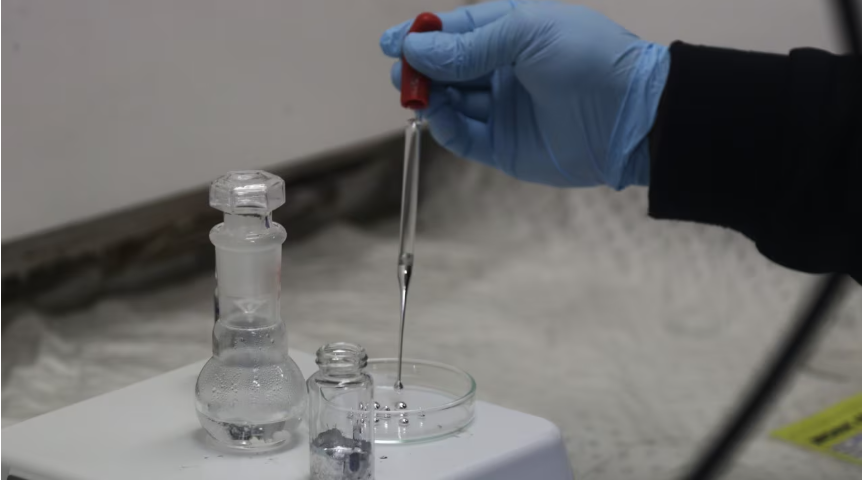According to experts who tested a novel approach they hope to replace energy-intensive chemical engineering procedures dating back to the early twentieth century, liquid metals could be the long-awaited panacea for “greening” the chemical industry.

Gallium liquid metal is placed in a petri dish via a syringe. Image Credit: University of Sydney/Philip Ritchie
Chemical manufacturing accounts for about 10-15% of overall greenhouse gas emissions. Chemical factories also consume more than 10% of total global energy.
Findings published in Nature Nanotechnology provide a much-needed breakthrough that moves away from conventional, energy-intensive solid-material catalysts. Professor Kourosh Kalantar-Zadeh, Head of the University of Sydney’s School of Chemical and Biomolecular Engineering, and Dr Junma Tang, who works at the University of Sydney and UNSW, are leading the study.
A catalyst is a material that accelerates and simplifies chemical reactions without participating in the reaction. Solid catalysts, which are primarily solid metals or solid metal compounds, are widely employed in the chemical industry to produce plastics, fertilizers, fuels, and feedstock.
However, the energy-intensive solid process of producing chemicals requires temperatures as high as 1,000 °C.
Instead, the novel technique employs liquid metals, in this case dissolving tin and nickel, which provide them with unusual mobility, allowing them to migrate to the surface of liquid metals and react with input molecules such as canola oil. This causes canola oil molecules to rotate, fragment, and reassemble into smaller organic chains, including propylene, a high-energy fuel critical to many industries.
Our method offers an unparalleled possibility to the chemical industry for reducing energy consumption and greening chemical reactions.
Kourosh Kalantar-Zadeh, Study Author and Professor, University of Sydney
“It is expected that the chemical sector will account for more than 20 percent of emissions by 2050. But chemical manufacturing is much less visible than other sectors-a paradigm shift is vital,” Kalantar-Zadeh added.
How Does the Process Work?
Atoms in liquid metals are more randomly organized and move more freely than those in solids. This permits them to quickly come into contact with chemical reactions and participate in them.
Kalantar-Zadeh stated, “Theoretically, they can catalyze chemicals at much lower temperatures – meaning they require far less energy.”
The scientists dissolved high melting point nickel and tin in a gallium-based liquid metal with a melting point of only 30 °C in their study.
By dissolving nickel in liquid gallium, we gained access to liquid nickel at very low temperatures – acting as a ‘super’ catalyst. In comparison solid nickel’s melting point is 1455 degrees centigrade. The same effect, to a lesser degree, is also experienced for tin metal in liquid gallium.
Dr Junma Tang, Study Author and Professor, University of Sydney
At the atomic level, the metals were distributed in liquid metal solvents.
So we have access to single atom catalysts. Single atom is the highest surface area accessibility for catalysis which offer a remarkable advantage to the chemical industry.
Dr Arifur Rahim, Study Senior Author and DECRA Fellow, School of Chemical and Biomolecular Engineering, University of Sydney
The researchers believe their method can be applied to other chemical reactions by mixing metals at low temperatures.
Dr. Tang concluded, “It requires such low temperature to catalyze that we could even theoretically do it in the kitchen with the gas cooktop – but don’t try that at home.”
Journal Reference
Tang, J., et al. (2023) Dynamic configurations of metallic atoms in the liquid state for selective propylene synthesis. Nature Nanotechnology. doi:10.1038/s41565-023-01540-x